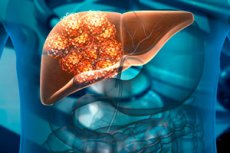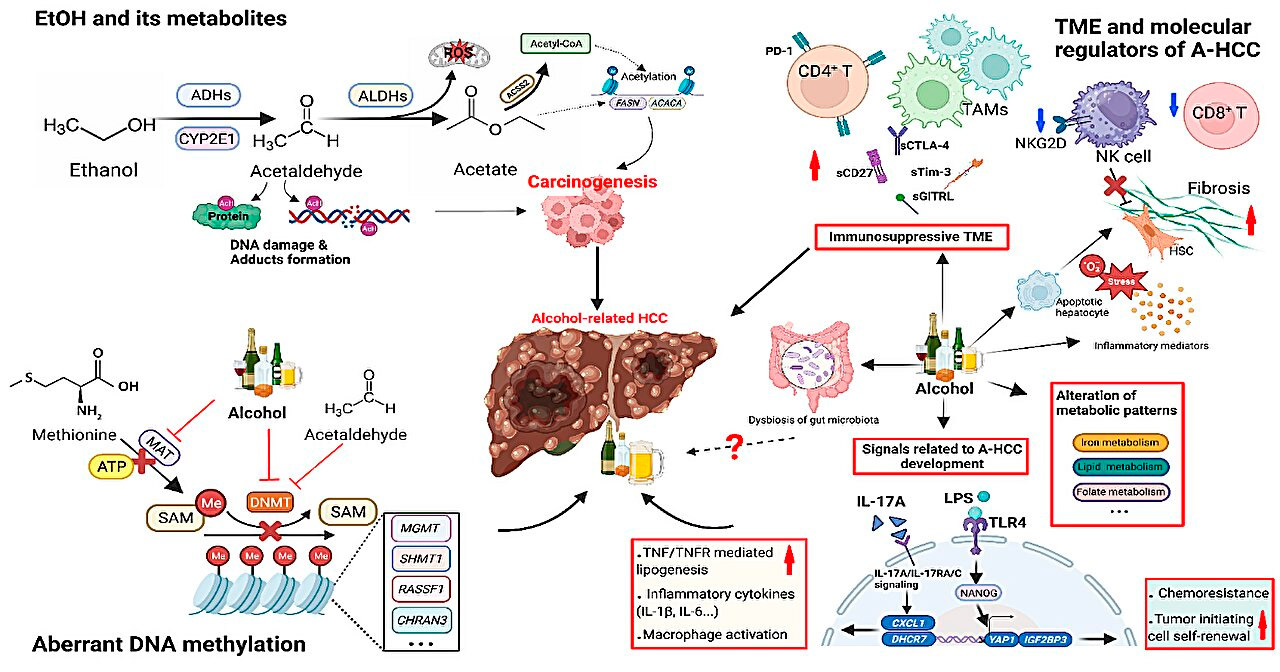New publications
New evidence on the link between alcohol consumption and aggressive liver cancer
Last reviewed: 02.07.2025

All iLive content is medically reviewed or fact checked to ensure as much factual accuracy as possible.
We have strict sourcing guidelines and only link to reputable media sites, academic research institutions and, whenever possible, medically peer reviewed studies. Note that the numbers in parentheses ([1], [2], etc.) are clickable links to these studies.
If you feel that any of our content is inaccurate, out-of-date, or otherwise questionable, please select it and press Ctrl + Enter.

Although excessive alcohol consumption is a well-known risk factor for liver cancer, the exact mechanisms by which alcohol promotes the development of alcoholic hepatocellular carcinoma (A-HCC) remain unclear.
This review, published in the journal Hepatology, provides a comprehensive summary of the pathogenesis, heterogeneity, preclinical approaches, epigenetic and genetic profiles of A-HCC. Compared with other types of liver cancer, A-HCC is often diagnosed at later stages, when the disease is already more advanced. This is partly due to the lack of available screening tools for individuals with alcoholic liver disease (ALD).
“A-HCC is a major public health problem,” said Yaojie Fu, lead author of the review. “Our work highlights the importance of understanding how alcohol and its metabolites contribute to this aggressive form of liver cancer. By exploring the unique characteristics of A-HCC, we hope to develop better diagnostic tools and treatment options.”
There is a strong link between alcohol consumption and the risk of A-HCC. People who drink a lot of alcohol are at a much higher risk of developing this aggressive form of liver cancer. However, the exact reasons why alcohol contributes to the development of A-HCC are not fully understood.
Compared with hepatocellular carcinoma (HCC) of other etiologies, A-HCC is often diagnosed at a later stage, when the disease is already more advanced. This may be explained by the lack of available screening methods for individuals with ALD. In this regard, the authors proposed that HCC screening and surveillance among patients with alcoholic cirrhosis, as well as more accurate risk stratification methods, are critical for early intervention in A-HCC.

Ethanol and its metabolites, epigenetic modifications, various types of metabolic alterations, immunosuppressive tumor microenvironment (TME), and oncogenic signaling pathways contribute to the development of alcohol-induced hepatocellular carcinoma (A-HCC).
Source: Fu, Yaojie, Maccioni, Luca, Wang, Xin Wei, Greten, Tim F, Gao, Bin.
In this review, the authors also discussed the potential role of genetics in the development of A-HCC. Single nucleotide polymorphisms (SNPs) of some specific genes may alter the risk of alcoholic cirrhosis and susceptibility to A-HCC. However, more research is needed to decipher the potential mechanisms by which SNPs influence A-HCC progression.
Moreover, the review also highlights the molecular mechanisms and heterogeneity of A-HCC. The development of better preclinical models is crucial for a deeper understanding of the characteristics, as well as for the prevention and personalized therapy of A-HCC in clinical practice.
